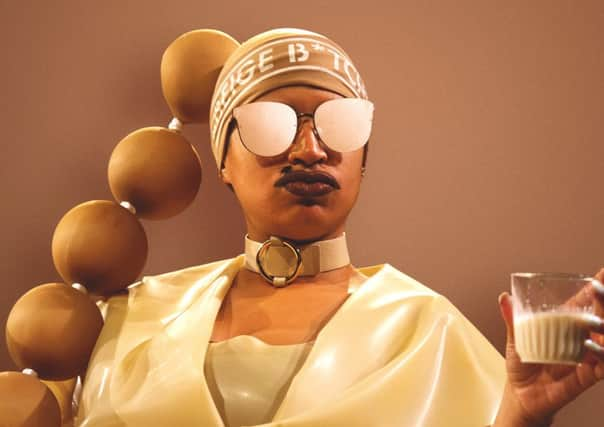Take Me Somewhere: Glasgow celebrates the world’s most radical theatre-makers


Glasgow has form in this area, of course. Ever since the founding of the Third Eye Centre (now the CCA) in the early 1970s, the city has been known as one of the spiritual homes of post-1960s experimental performance; and from the late 1980s, Nikki Millican’s National Review of Live Art – a biennial international meeting-point for experimental theatre artists – found a semi-permanent base in Glasgow, first at the CCA, then at the Tramway and the Arches.
So there’s something particularly satisfying about the fact that almost a decade on from the NRLA’s demise, Glasgow now has a new international festival of experimental work in Take Me Somewhere, founded by Wylie in 2017, just before she moved on to become artistic director at the National Theatre of Scotland, and now directed by LJ Findlay-Walsh, Wylie’s long-term associate at the Arches and elsewhere.
Advertisement
Hide Ad“You know, when we were first wondering about a name for this new festival,” says Findlay-Walsh, “I was the one saying to Jackie, ‘no, I don’t think so, not Take Me Somewhere.’ But now I’m so grateful for that name, because it so exactly sums up what we want to do.”
The idea, back in 2017, was that despite the loss of the Arches, Glasgow could still stage experimental theatre in other spaces and unexpected places across the city; so the title implied both a new geographical adventure in finding performances spaces, and also the key role of experimental theatre in taking us on previously unimagined intellectual and emotional journeys. And two years on, the festival team are honouring that concept with a 2019 programme bursting with
fierce international debate around a range of electrifying themes, from gender politics, race and colonialism to the whole impact of popular culture and social media on our sense of self.
“I never start out with a theme in mind,” says Findlay-Walsh. “For me, it’s always about the artists, and what they want to do. This year, though, we’re definitely seeing a lot of work around themes of #metoo, trolling and online personas – about how we present ourselves through the online world, about whose gaze matters, and about voyeurism and pornography in that context.
“There are four shows in the programme that seem particularly relevant to that – Lauren Barri Holstein’s show Notorious, about Medusa and other female monsters, which opens the festival; then Mette Ingvartsen’s 21 Pornographies, Samira Elagoz’s Cock Cock Who’s There, based on an experience of rape, and Glasgow-based artist Nima Sené’s brilliant show Beige B*tch, which explores the relationship between the white gaze and people of colour. Truthfully, though, these themes run through the whole programme – the whole idea of staging a festival is to create a situation where the various pieces of work talk to each other, and a dialogue can begin.”
In total, the Take Me Somewhere programme lists 19 events, most of them one-off performances, and some of them wildly-curated parties; the closing party on 25 May will be staged by Brighton-based duo Brownton Abbey, and is billed as an “Afro-futurist performance party with a Space Church theme.” The aim is always to challenge the more complacent and comfortable aspects of our culture – like Downton Abbey – with unsettling left-field attitudes to gender, race, class, disability; and shows like Edinburgh-based Palestinian dancer Farah Saleh’s Brexit means Brexit!, and Sonic Seance, created by four young black performers based in Scotland, also seem likely to raise tough questions about Britain’s attitudes to itself, its colonial history, and its own 21st century diversity.
Advertisement
Hide AdThere’s also a strand of work that deals directly with the impact of popular culture and music on our lives, ranging from Brian Label’s Binge – an exploration of how and why we binge-watch box-set drama, to be staged at Paisley’s Piazza Shopping Centre – to New York-based Zimbabwean artist Nora Chipaumire’s 100% Pop, about the history of the interface between black culture and mainstream popular music. Ásrún Magnúsdóttir’s Listening Party has children using their favourite pop music to illustrate their own lives, and dancer Simone Kenyon – inspired by early 20th century Scottish writer Nan Shepherd – will lead audiences on a day trip to the Cairngorms, in an exploration of walking as a pastime, and the relationship between women’s bodies and the natural landscape.
“I think we’re in the really lucky position of being able to partner a huge range of organisations that I and other people in Glasgow have been working with for years,” says Findlay-Walsh. “We’ve got a deep understanding of the aims and priorities of our partners, in Britain and beyond, and that makes it relatively easy to work creatively together, and leaves me in the fortunate position of having more opportunities to programme great work than I know what to do with. And in terms of the legacy of the Arches, we can also carry on that great tradition of blurring the boundaries between theatre and performance, live music, club nights and parties. When the building closed in 2015, one clubber said on social media, ‘They’ve closed down our temple.’ But I’m still interested in that sense of the sacred and mysterious and transformative in performance; and with Take Me Somewhere, we can open that space up again, and keep on exploring it.”
Take Me Somewhere runs from 11 May until 2 June, in spaces across Glasgow.